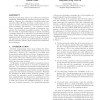Free Online Productivity Tools
i2Speak
i2Symbol
i2OCR
iTex2Img
iWeb2Print
iWeb2Shot
i2Type
iPdf2Split
iPdf2Merge
i2Bopomofo
i2Arabic
i2Style
i2Image
i2PDF
iLatex2Rtf
Sci2ools
APLAS
2004
ACM
2004
ACM
Network Fusion
Modular programming enjoys many well-known advantages: readability, maintainability, separate development and compilation. However, the composition of modular units (components) suffers efficiency problems. In this paper, we propose an invasive composition method which strives to reconcile modularity and efficiency. Our technique, network fusion, automatically merges networks of interacting components into equivalent sequential programs. We provide the user with an expressive language to specify scheduling constraints which can be taken into account during network fusion. Fusion allows to replace internal communications by assignments and alleviates most time overhead. We present our approach in a generic and unified framework based on labeled transition systems, static analysis and transformation techniques.
Related Content
| Added | 30 Jun 2010 |
| Updated | 30 Jun 2010 |
| Type | Conference |
| Year | 2004 |
| Where | APLAS |
| Authors | Pascal Fradet, Stéphane Hong Tuan Ha |
Comments (0)

